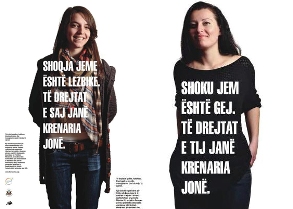Kosovo Human Rights Activists Resist Attacks on LGBT Community

The author, a mtvU/Fulbright fellow in Kosovo, confronts an outbreak of religious extremism of unexpected violence, directed against LGBT expression in Prishtina.
Bruises cover her back, ribs, and the sides of her arms. She has a missing tooth, yet still greets me with a warm smile and bright eyes. An American citizen of Albanian descent working in Prishtina, she had not come out publicly as a lesbian. An event held at the office of Libertas, an LGBT organization in Kosovo's capital, was her first association with the LGBT community.
She was the only one hospitalized that night in mid-December when a mob of men broke into the office, vandalized the property and sought to beat anyone there. "I am angry that this happened," she told me. "I want justice." She was looking down at her hands, breaking a piece of plastic into tiny pieces.
She had just returned to her apartment in Prishtina where close friends were keeping her company. I, a sister Albanian American and an mtvU/Fulbright fellow, offered to help with yoga, music, and meditation. It didn't take long to realize her body was not yet ready. I still think about her safety as I write this. Does her family know that she is a lesbian? Or that she has been brutally beaten?
I first encountered Libertas through an affiliate who sits on their board. They were getting ready to launch a campaign that features images of people with the slogan, "My friend is gay or lesbian. His/her rights are our rights." I agreed to participate as a model and an ally. I knew that this would cause a backlash. Although LGBT groups have existed here for nearly a decade, the ads are the first campaign of this kind in Kosovo. But I had no idea what the extent of this backlash would be. With my face on billboards throughout the city, I've been told to keep a low profile. For the first time in my life, I can begin to understand what it must feel like to be closeted. I wrap a scarf around my head. Most of the time I take cabs.
The Albanian community has historically aligned itself on ethnic grounds regardless of faith. Yet, even here religious extremism has made an appearance. Some accounts blame a sports group for the assault on the LGBT community. Others claim it was a group from a local mosque.
The Libertas incident was the second assault by mobs of men chanting such slogans as "out with the gays, out with the whores," and "Allah is the greatest." The first occurred the day before when a local magazine, Kosovo 2.0, launched an issue on sexuality. I attended that event, where Igballe Rogova, a local activist and the first person in Kosovo to come out as a lesbian, read a correspondence with her Serbian friend and fellow activist Lepa Mladjenovic. During the war, Mladjenovic had visited refugee camps in Macedonia where Rugova was organizing music workshops with women who had been sexually violated by Serbian soldiers.
Besa Luci, the editor of Kosovo 2.0, had a shaky voice as she introduced the evening's program. I was unaware that a violent attack had taken place just half an hour earlier, though something didn't feel right. Police officers were at the entrance, and the smashed mannequins I saw on the ground weren't exactly conceptual art. Then the mob returned and everyone in attendance had to be escorted out of the building in small batches for safety. Since that evening there have been haunting videos on YouTube with bullet targets on pictures of Luci and Rogova. Only one man has been detained for the crimes, and he was released after a few hours. Nobody else has been even reprimanded.
Later, in the apartment of our friend injured in the Libertas attack (whose identity must remain private), we sipped tea and shared secrets. "I always read about women who experience violence in other parts of the world," she said, "but I never imagined that I would be one of those women." She spoke with no remorse. "Everything happens for a reason." The men who attacked her came from behind and she was angry at their cowardice. "If you're going to fight me, fight me to my face," she said.
Attacks on human rights in the name of Allah are a very new phenomenon here. This extent of intolerance is not normal in Kosovo society. Case in point, I was talking with three local friends—all young Albanian men who identify as Muslim—who at first did not support basic dignity for the LGBT community. By the end of our conversation, we were able to find enough common ground to agree to three basic concepts: that human rights for everyone need to be honored in a free and open society, that religious arguments against homosexuality lack validity since, in their words, "nobody can give judgment on behalf of Allah," and that nobody should ever live in fear and uncertainty for the sake of someone else's comfort and privilege.
I was thinking about this conversation as I was speaking with my friend. The real question is how will Kosovo—as a small, young, secular country—deal with the threat of religious fundamentalism, something that nobody here was prepared to confront before the brave campaigns of Libertas and Kosovo 2.0.
More articles by Category: International, LGBTQIA, Religion, Violence against women
More articles by Tag:



























